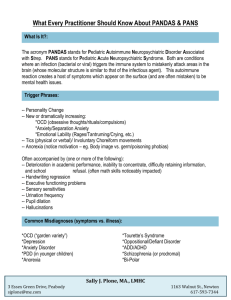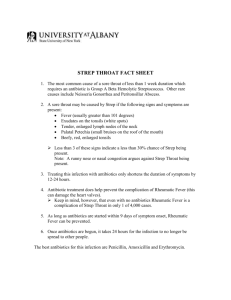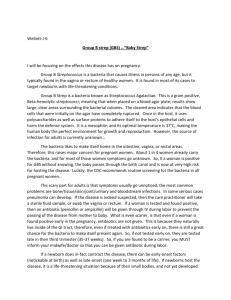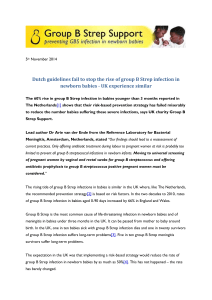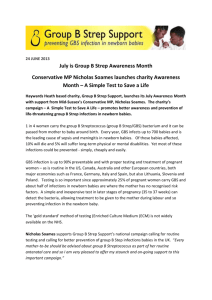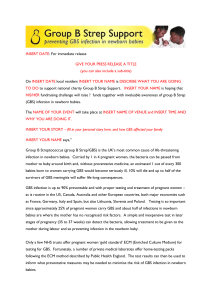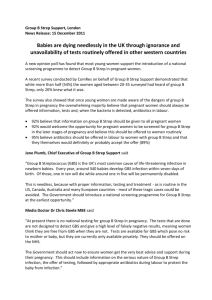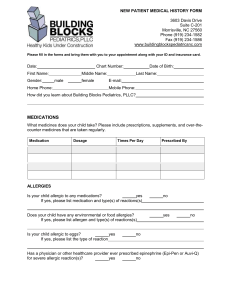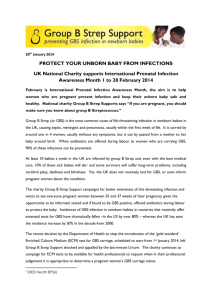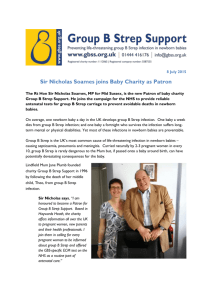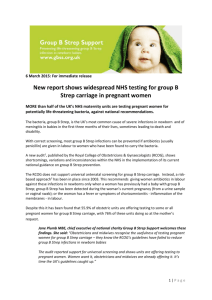International Prenatal Infection Prevention Month
advertisement
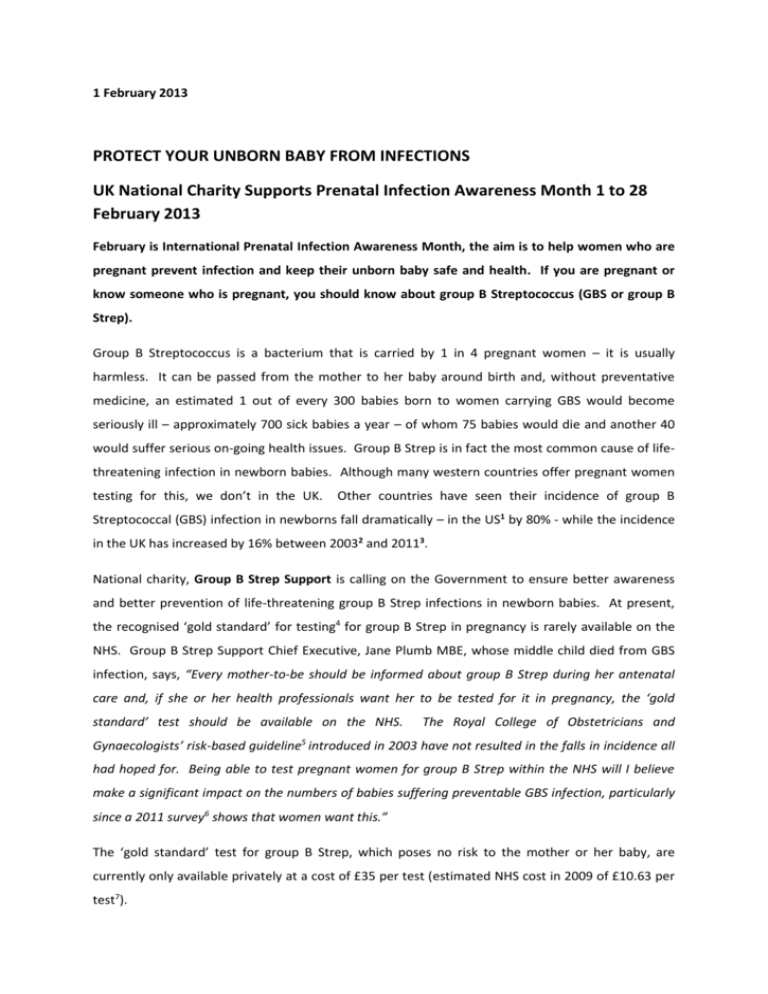
1 February 2013 PROTECT YOUR UNBORN BABY FROM INFECTIONS UK National Charity Supports Prenatal Infection Awareness Month 1 to 28 February 2013 February is International Prenatal Infection Awareness Month, the aim is to help women who are pregnant prevent infection and keep their unborn baby safe and health. If you are pregnant or know someone who is pregnant, you should know about group B Streptococcus (GBS or group B Strep). Group B Streptococcus is a bacterium that is carried by 1 in 4 pregnant women – it is usually harmless. It can be passed from the mother to her baby around birth and, without preventative medicine, an estimated 1 out of every 300 babies born to women carrying GBS would become seriously ill – approximately 700 sick babies a year – of whom 75 babies would die and another 40 would suffer serious on-going health issues. Group B Strep is in fact the most common cause of lifethreatening infection in newborn babies. Although many western countries offer pregnant women testing for this, we don’t in the UK. Other countries have seen their incidence of group B Streptococcal (GBS) infection in newborns fall dramatically – in the US1 by 80% - while the incidence in the UK has increased by 16% between 20032 and 20113. National charity, Group B Strep Support is calling on the Government to ensure better awareness and better prevention of life-threatening group B Strep infections in newborn babies. At present, the recognised ‘gold standard’ for testing4 for group B Strep in pregnancy is rarely available on the NHS. Group B Strep Support Chief Executive, Jane Plumb MBE, whose middle child died from GBS infection, says, “Every mother-to-be should be informed about group B Strep during her antenatal care and, if she or her health professionals want her to be tested for it in pregnancy, the ‘gold standard’ test should be available on the NHS. The Royal College of Obstetricians and Gynaecologists’ risk-based guideline5 introduced in 2003 have not resulted in the falls in incidence all had hoped for. Being able to test pregnant women for group B Strep within the NHS will I believe make a significant impact on the numbers of babies suffering preventable GBS infection, particularly since a 2011 survey6 shows that women want this.” The ‘gold standard’ test for group B Strep, which poses no risk to the mother or her baby, are currently only available privately at a cost of £35 per test (estimated NHS cost in 2009 of £10.63 per test7). Group B Strep Support is asking that: - Information about group B Strep should be routinely given to all women as part of their antenatal care Sensitive testing for group B Strep should be made freely available within the NHS and available at the request of pregnant women and their health professionals Antibiotics should be offered intravenously in labour to all mums whose babies are known to be at higher risk of developing GBS infection The use of the ‘standard’ test within the NHS for the detection of GBS carriage in pregnancy should cease and vaginal swabs taken from pregnant women should always be tested using a method that offers good sensitivity for GBS dictation. Jane Plumb MBE adds, “The Government should act now to ensure women get the very best advice and support during their pregnancy. This includes giving information on the serious nature of group B Strep infection, offering testing late in pregnancy, followed by antibiotics during labour where appropriate to protect the baby from infection.” For further information: Jane Plumb, Chief Executive, Group B Strep Support for comment or greater detail Tel: 01444 416176 e-mail: jplumb@gbss.org.uk Mobile (not for publication): 07986 745387 Group B Strep Support, P O Box 203, Haywards Heath, West Sussex RH16 1GF www.gbss.org.uk. Registered Charity No 1112065. Company Registration No 5587535 Editors Notes: * Group B Strep is a normal bacterium carried by up to 30% of adults. It can be passed from mother to baby around labour. This causes no problems for most babies: for others can be deadly, causing blood infection, pneumonia and meningitis. * Group B Strep is the most common cause of life threatening infection in newborn babies. In the England, Wales & Northern Ireland, the reported number of these infections has increased from 229 to 281 between 2003 and 2011 (up by 23%) and the rate per 1,000 live births has increased from 0.37 to 0.38 (up by 3%) since the introduction of the Royal College of Obstetricians & Gynaecologists’ 2003 prevention guidelines. These increases come despite the expectation of significant falls in group B Strep infections in newborn babies following the introduction of the Royal College of Obstetricians & Gynaecologists’ 2003 guidelines. Data sourced from annual CDR/Health Protection Reports http://www.hpa.org.uk/Topics/InfectiousDiseases/InfectionsAZ/StreptococcalInfections/Epifemiolog icalData/ * A report on preventable death and disability caused by group B Strep calls for routine screening as incidence continues to rise in newborn babies in the UK was launched by Group B Strep Support at House of Commons event on 28 June 2012 www.gbss.org.uk/filepool/2012_06_28_GBSS_Report.pdf . * Newborn babies are at higher risk of developing group B Strep infection if there are certain ‘risk factors’ present during the pregnancy, labour and delivery. These are: Mum carrying group B Strep during the current pregnancy, Mum having a urinary tract infection caused by group B Strep during the current pregnancy, a previous sibling having developed group B Strep infection, Mum’s waters breaking more than 18 hours before delivery, labour starting or waters breaking before 37 completed weeks of pregnancy and Mum having a fever in labour. * ComRes interviewed 1,000 20-35 year old women in the UK online between 28th October and 1st November 2011. Data was weighted to be demographically representative of 20-35 year old women in the UK. The full data tables are available at www.comres.co.uk (http://www.comres.co.uk/). * A few NHS trusts make sensitive testing for group B Strep available to pregnant women at the request of their health professionals, but most don’t. A number of private medical laboratories do – packs containing the necessary swabs are supplied free, with the postal service for carrying out the test costs around £35. See http://www.gbss.org.uk/test for the availability of sensitive testing following the Health Protection Agency’s B 58 from NHS trust and private laboratories. It has been estimated that the providing the test on the NHS would cost around £10.637 each. Group B Strep Support has no links and receives no money from any laboratory. * Group B Strep Support provides information and support to families and health professionals affected by group B Strep. It is the UK’s only charity dedicated to the prevention of group B Strep infection in newborn babies and provides comprehensive and reliable information on group B Strep, both printed and online. Group B Strep Support is supported by an independent medical advisory panel http://tinyurl.com/GBSS-MAP. Research papers: 1. Research Papers: 1Jordan HT, Farley MM, Craig A, Mohle-Boetani J, Harrison LH, Petit S et al. Revisiting the need for vaccine prevention of late-onset neonatal group B streptococcal disease: a multistate, population-based analysis. Pediatr Infect Dis J 2008; 27(12):1057-1064. 2 Commun Dis Rep Wkly [serial online] 2004; 13(16) Bacteraemia. Pyogenic & non-pyogenic Streptococcal bacteraemia, England, Wales & Northern Ireland: 2003. http://www.hpa.org.uk/cdr/archives/2004/cdr1604.pdf 3 Health Protection Agency. Pyogenic and non-pyogenic streptococcal bacteraemia, England, Wales and Northern Ireland: 2011. Health Protection Report 2012; 6(46): Bacteraemia http://www.hpa.org.uk/webc/HPAwebFile/HPAweb_C/1317136996075 4Health Protection Agency (2006). Processing swabs for Group B streptococcal carriage. National Standard Method BS 58. 5Royal College of Obstetrics and Gynaecology. Prevention of Early Onset Neonatal Group B Streptococcal Disease. London: Royal Colllege of Obstetrics and Gynaecology, 2012. Guideline No. 36. 6ComRes- 1,000 interviews were carried out between 28 October and 1 November 2001 of women aged 20-35. www.comres.com. 7Daniels J, Gray J et al. Rapid testing for group B streptococcus during labour: a test accuracy study with evaluation of acceptability and cost-effectivness. Health Tchnol Assess 2009;13(42)
